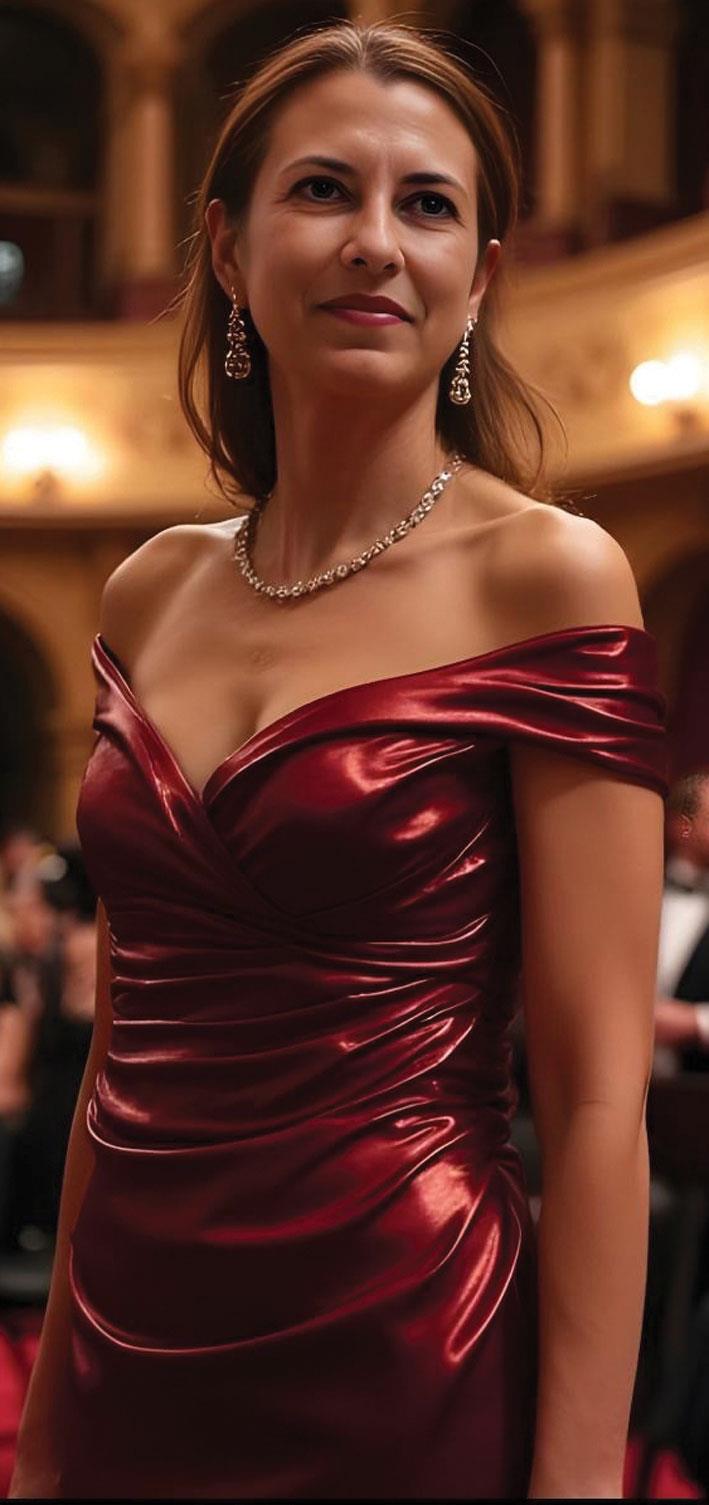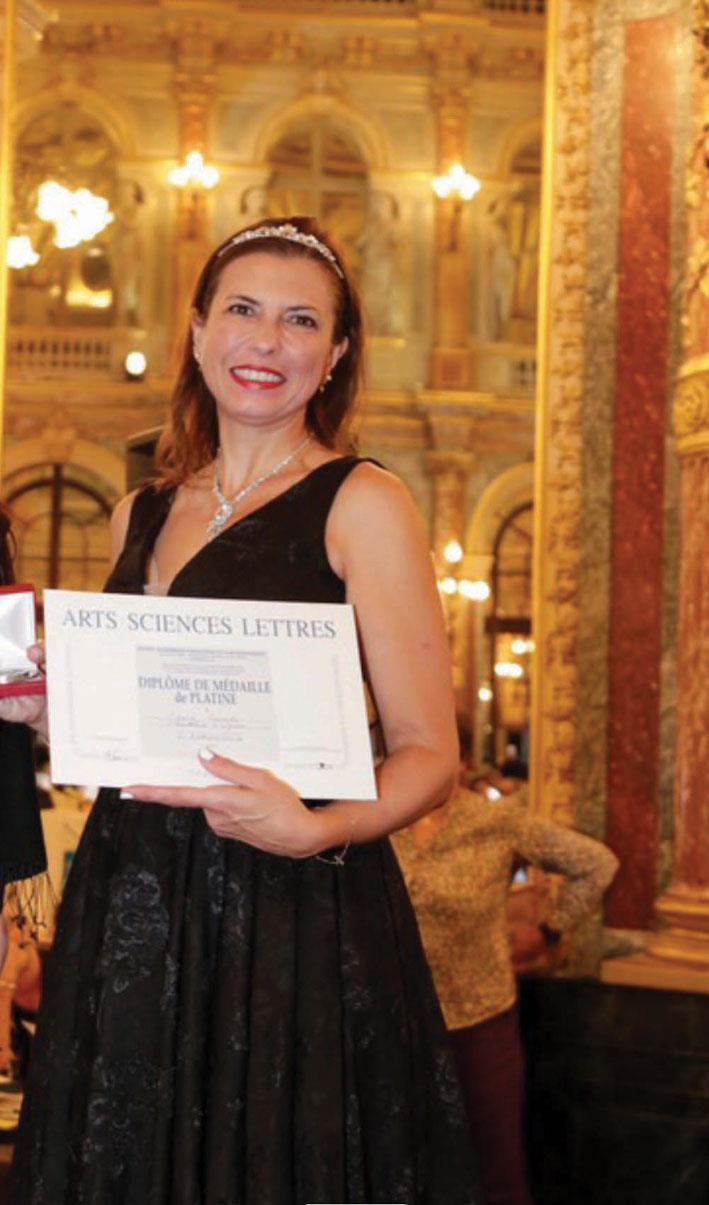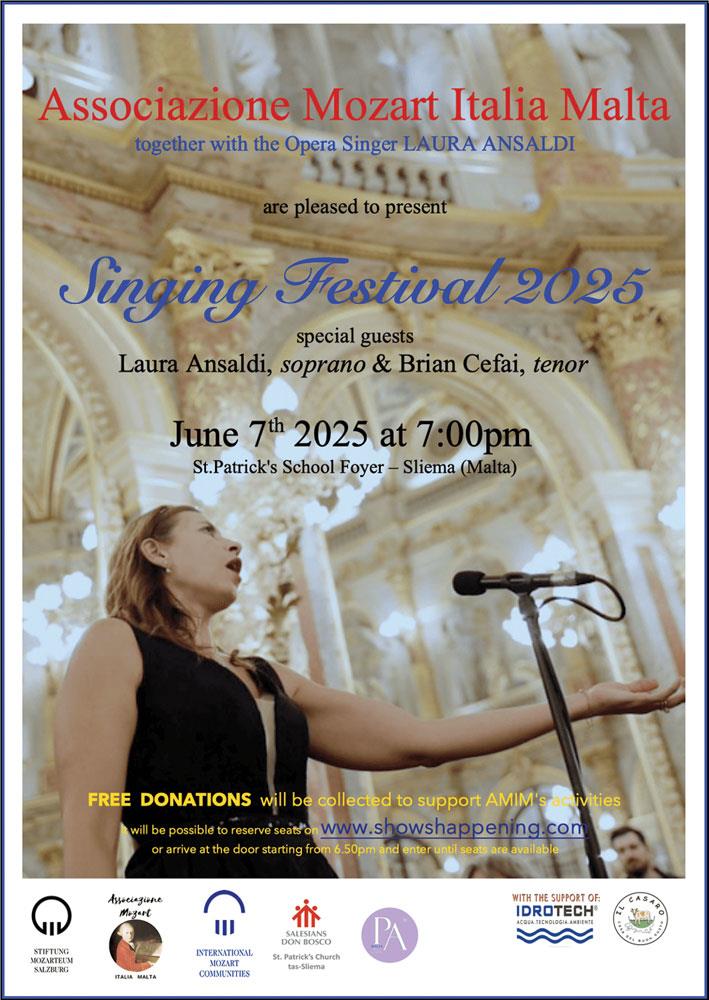Is there a history of musical talent in your family? Were you influenced by any relatives or mentors growing up?
Since my very early childhood I knew that my professional life would have been in music and performing arts, and I started my career as an opera singer quite early. But, I always felt huge curiosity and attraction for mathematics and business sciences. We can call it my passion, my most important hobby. Also, I am convinced that everyone, no matter what their job is, would benefit from a good knowledge of the most important principles of economics and of the main quantitative instruments, for better understanding society, science and in general the world we live in. So I studied those two subjects as well.

Apart from singing, did you take other courses to enhance your performance abilities, such as drama or stage presence training?
My mother's family is a family of musicians. My mother and her two sisters (my aunts) are all pianists, and my little cousin is a violinist. Our family gatherings are filled with music, with someone sitting at the piano and playing, improvising and singing. My mother is still a renowned piano teacher in Italy. On my father's side, my grandfather was a huge opera lover who introduced me to the most famous operas when I was only a little girl. So, the soundtrack of my childhood is made up of classical music and opera.
I am a pianist, too. It is very important for an opera singer to be autonomous while training or preparing a role. And, I studied performing arts (acting and dancing) at the Actors Studio. Besides providing me with some minor experiences in acting, studying performing arts allowed me to develop a special awareness on stage, to give my best while interpreting an opera role and to offer to my audience a complete performance.

In your experience, which cities provide the best opportunities for aspiring opera singers? What unique advantages do they offer?
Well, I wouldn't talk about cities but rather about countries. In my experience, I found the USA a great country for opera singers and for performers in general. I don't want to fall into the cliché of mentioning the American dream because there are also many challenges there. However, meritocracy is highly fostered, with numerous opportunities available and a wide range of entities, such as management agencies and academies, especially for young artists to help them find their path. My first agent was from Boston, and I am very grateful to him. Also, I want to mention Germany, for the excellence of its opera houses (both in big and the smaller cities) and for the wave of innovation and creativity that has pervaded the country for several years now.
Live performances can be unpredictable. Have you ever experienced an embarrassing or unexpected moment on stage - such as a voice crack, wardrobe malfunction or forgotten lyrics? How did you handle it?
Indeed, live performances can be unpredictable, and the job of a performer is one of the very few where you aren't permitted to make the smallest mistake. That's why I teach my students the art of aiming for perfection, and of mastering every detail.
In my career I never experienced a voice crack, but losing a wig onstage, yes. I still laugh at that embarrassing moment even now. I also recall some memory blackouts. The secret of handling such situations successfully (this is another thing that I teach my students) is fast thinking. Training our brain to think fast is crucial when you are on stage and you have just a few seconds to decide how to react to a situation. The goal is always to keep the audience in the magic bubble of the performance: when the audience notices an imperfection, when someone thinks "Oh, that was a mistake", the magic is gone, the bubble is broken.
As a coloratura soprano, you've played leading roles in operas such as La Forza del Destino (Leonora), Don Carlos (Elisabetta), Nabucco (Abigaille) and La Bohème (Mimi). Do you have a favourite role, and if so, what makes it special to you?
My absolute favourite role is Elisabetta in Don Carlos. So different from other Verdi classical heroines, so very royal in the way she loves and expresses her feelings. I am also very much attached to two characters that are actually very different from me (one because she is evil, and the other because she is blinded by love). But I love to interpret them because of their strength: I'm talking about Abigaille in Nabucco and Liu in Turandot.
Which role has been your most challenging so far, either vocally or emotionally? You're also an acclaimed vocal teacher, currently based in Switzerland. What do you find most fulfilling about mentoring the next generation of opera singers?
Vocally challenging, for sure Traviata and even more so Lucia di Lammermoor. Those are roles that require a deep, powerful and agile high voice, qualities that often are in contrast and difficult to obtain in the same performance. They are roles where the soprano is on stage almost all the time, so difficult to handle. Emotionally challenging, since I am a mother, I find two operas where the relationship mother/son is involved in a tragic and unhappy way, namely Madama Butterfly and Suor Angelica. It is hard for me even to imagine that such scenarios can occur in life.
As to my teaching role, it is a beautiful journey and I could talk about it for hours. Let me just say that there is nothing more beautiful than nurturing a talent, helping young students to open their wings and fly (and when I say young I mean young in experience, because for me music is not a matter of age). Watching them go through all the challenges that an opera singer, and a performer in general, has to tackle is more than fascinating. Seeing them succeed is for me more rewarding than my own successes.
As a wife and mother of two, how do you manage to balance an international singing career, teaching commitments and family life? Do you have any strategies that help you juggle everything?
This is also something I could talk about a great deal. I always dreamt of being a mother, and my children are my biggest accomplishment and source of happiness. They are my main job. When my eldest was born, I stopped everything I was doing. Then, after a couple of years following the birth of my youngest, I restarted, but with clear boundaries in terms of nights spent out of home, amount of hours worked, visibility on the social media, etc. Today I only do some of what I used to do and and I say no very often to very interesting opportunities, but this is the choice I made, the choice that makes me happy. The only strategy for those raising a family that I can suggest, is to understand what one's own priorities are and to stick to them.
Your involvement in charitable work shows a deep commitment to helping others. What drives this passion, and how do you integrate philanthropy into your busy life?
I see myself as a very lucky person. I went through many challenges in my life, but I always had some "guardian angels" (I like to call them like that) who protected me and allowed me to become who I am. I believe that in life, you have to give back what you have received. I am raising my children with the same philosophy, always reminding them how privileged they are, and involving them as much as possible in the charitable activities I undertake. Integrating philanthropy in a busy life is not difficult if one wants it... there are so many ways to help people, and it is not always a matter of doing something big, on the contrary. Sometimes small actions are very important. Of course, being a person with a certain visibility creates situations where some of my charitable activities are under the spotlight and announced on social media, but there are so many small things I do everyday, alone or with my family, that everyone can do and that are also important.
Opera is often perceived as traditional, yet it continues to evolve. How do you see the future of opera, and do you believe modern adaptations can draw in a new generation of audiences?
You see, the problem is, that opera was more modern and closer to people 200 years ago than now. Contemporary artistic directors and stage makers try every kind of innovation and sophistication, and they think they are progressing, but it is the opposite. Let me clarify. At the time of Verdi and Puccini, people used to come to the opera bringing food and wine with them. It was a place to socialise and be together while listening to beautiful music. People looked forward to going to the opera. But it was a very relaxed environment. Also, some people simply wanted to go to listen to their idols or maybe to a friend singing their favourite arias, so they were coming and going accordingly. People were respectful of the music, but sometimes they were commenting and talking to each other. Opera was for everyone. Can you imagine someone bringing food to an opera house today? And you know what happens if someone dares to say a word or cough? Today there is a huge distance between the artists and the audience, and the new "creative and innovative" stage doesn't help; opera these days is for just the elite. When it happens that a production allows me to perform the way I want, I love to break those barriers; I want to find a way to be closer to the audience, to make them feel they are part of it.
What advice would you give to young singers hoping to break into the professional opera scene today?
Discipline and resilience, those are the two qualities that I will never stop reminding my students to aim for. Discipline means striving for perfection, studying hard every day to master the highest levels of technique, because passion itself isn't sufficient. Resilience, because failure will happen sometimes no matter what. There is no great artist (or athlete or entrepreneur) in this world, who never failed in their life. If they reached the top, it is because they could overcome failure and learn from it.
What do you hope to achieve during your stay in Malta?
I had the pleasure to know the Mozart Association Italy Malta and its brilliant director Debora Comper this January, when I was invited to sit on the jury of the Mozart competition. I discovered a very professional and inspired environment, committed to nurture and promote young talents and to spread the beauty of music to everyone. I love this kind of place, and I am very grateful to have been invited once more to the singing festival. It will begin with a masterclass led by me and conclude with a gala concert featuring performances by my students, as well as by myself and the Maltese tenor Brian Cefai.
I look forward to all this and I warmly invite you all to be there.
